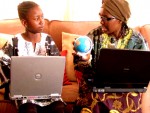A knowledge repository is an online database that organises, displays and categorises information. It can be used to provide support and management for many services, including encouraging open access to scholarly research, preserving digital materials for the long term and showcasing academic research. But whilst repositories are becoming increasingly commonplace in Africa and around the world as houses of shared institutional memory, information on […]
Author: Juliane Walter
Skype’s 10th Birthday – tell us your story!
This week marks ten years since the web address www.skype.com was registered. At the time, telephone companies were concerned: by offering free video calls over the Internet, Skype had not only introduced a form of communication more futuristic than mobile telephony (almost, perhaps, the stuff of science fiction), but also fundamentally undermined the communications industry’s business models.
ICT against Inequality
International Girls in ICT Day this year saw new projects set up worldwide to create an environment that encourages girls and young women, at present disadvantaged by a gender-based digital divide of worldwide prevalence, to consider careers in the field of ICT. But why is there a gender imbalance in the technology sector at all, and what’s being done to fix it? The eLearning […]
Education in refugee camps
ICT has become an essential tool for humanitarian aid work, and its role in both education and healthcare throughout sub-Saharan Africa is indispensable: particularly its use in educating large groups of young refugees, from diverse backgrounds and with varying levels of basic education and literacy. The eLearning Africa News Service took a look at the inspiring way ICT is being put to use in […]
Building lasting bridges: Good and bad eGovernment strategies in Africa
The successful implementation of ICT in governmental operations can help to bridge a gap between citizens and governments by promoting transparency and a more citizen-friendly style of government. When used effectively, eGovernment can act as a catalyst toward sustainable development and help to build and stabilise economies. However, technology is not the solution in itself, and governments need to think about exactly how to […]
The EAST Challenge 2013: Brandberg Königstein Summit Trek!
Dear adventurers, The eLearning Africa Scholarship Trust (EAST) is very excited to announce the details of the EAST Challenge 2013.








